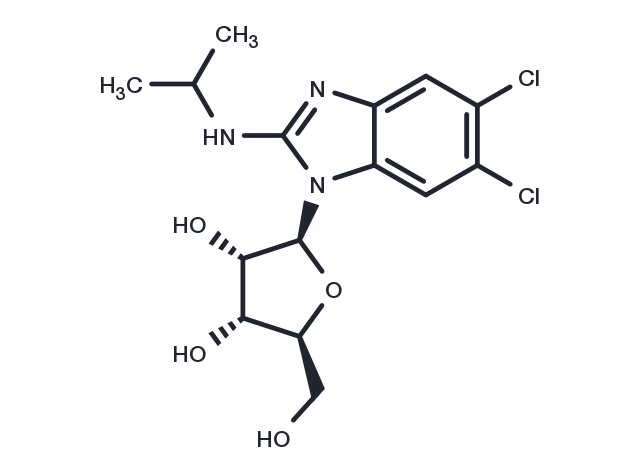Powder: -20°C for 3 years | In solvent: -80°C for 1 year


Maribavir (GW257406X) is an orally available benzimidazole riboside compound with activity against cytomegalovirus (CMV). Maribavir is a selective ATP competitor of the viral UL97 kinase, which is involved in viral nuclear maturation events, such as viral DNA assembly and movement of viral capsids from the nucleus of infected cells. Maribavir has activity against strains of CMV that are resistant to standard anti-CMV agents.

| Pack Size | Availability | Price/USD | Quantity |
|---|---|---|---|
| 1 mg | In stock | $ 36.00 | |
| 2 mg | In stock | $ 51.00 | |
| 5 mg | In stock | $ 89.00 | |
| 10 mg | In stock | $ 143.00 | |
| 25 mg | In stock | $ 259.00 | |
| 50 mg | In stock | $ 433.00 | |
| 100 mg | In stock | $ 643.00 | |
| 1 mL * 10 mM (in DMSO) | In stock | $ 97.00 |




| Description | Maribavir (GW257406X) is an orally available benzimidazole riboside compound with activity against cytomegalovirus (CMV). Maribavir is a selective ATP competitor of the viral UL97 kinase, which is involved in viral nuclear maturation events, such as viral DNA assembly and movement of viral capsids from the nucleus of infected cells. Maribavir has activity against strains of CMV that are resistant to standard anti-CMV agents. |
| Targets&IC50 | Histone phosphorylation:3 nM |
| In vitro | Maribavir effectively inhibits the autophosphorylation of both the wild type and the major Ganciclovir (GCV)-resistant UL97 mutants, showing a mean IC50 of 35 nM. The M460I mutation increases sensitivity to Maribavir, decreasing its IC50 to 4.8 nM. However, a Maribavir-resistant UL97 mutant (L397R) exhibits significantly reduced kinase activity, functioning at approximately 10% of the wild type levels for both GCV kinase and protein kinase activities. Enzyme kinetic studies reveal that Maribavir acts as a competitive inhibitor against ATP, with a Ki of 10 nM. Furthermore, Maribavir inhibits viral replication in a dose-dependent manner, achieving an IC50 of 0.12±0.01 μM as per a multicycle DNA hybridization assay, and strongly inhibits pUL97 protein kinase with a 50% inhibition concentration of 3 nM. |
| Kinase Assay | Enzyme kinetic analysis is performed on the purified wild type and mutant UL97 protein species using increasing concentrations of ATP (2 μM to 20 μM). The amount of incorporated radiolabelled phosphate is plotted against the concentration of ATP in a Lineweaver Burke plot to determine the Km for ATP for each UL97 species. The effect of Maribavir upon the rate of radiolabelled phosphate incorporation by wild type or mutant UL97 is determined by protein kinase assays at a fixed concentration of Maribavir (0.5 μM) as above, or with increasing concentrations of Maribavir (0.01 μM to 5.0 μM) to determine the IC50 of Maribavir for each UL97 species. In order to determine the nature of the inhibition mediated by Maribavir, plots of 1/v vs 1/ATP with increasing concentrations of Maribavir are constructed. Competitive inhibition is evident if the family of lines cconverged on the y-axis at 1/Vmax. The change in slope caused by the addition of Maribavir is used to calculate the Ki[1]. |
| Cell Research | Maribavir (1263W94) is dissolved in DMSO and stored, and then diluted with appropriate media before use[2]. For these studies MRC-5 cells are seeded in 24-well plates at ~5×104 cells/well and grown for 3 days in MEM 8-1-1 to confluence (~1.1×105 cells/well). The cells are infected with AD169 in MEM 2-1-1 at an MOI ranging from 1 to 3 and incubated at 37°C for 90 min to allow viral adsorption. The unadsorbed virus is removed and replaced with 1 mL of MEM 2-1-1. To test the effect of compounds on viral DNA synthesis or maturation, Maribavir, BDCRB, or GCV is added to the medium at the concentrations indicated for each experiment[2]. |
| Synonyms | BW1263W94, GW257406X, Benzimidavir, 1263W94 |
| Molecular Weight | 376.24 |
| Formula | C15H19Cl2N3O4 |
| CAS No. | 176161-24-3 |
Powder: -20°C for 3 years | In solvent: -80°C for 1 year
DMSO: 50 mg/mL
You can also refer to dose conversion for different animals. More
bottom
Please see Inhibitor Handling Instructions for more frequently ask questions. Topics include: how to prepare stock solutions, how to store products, and cautions on cell-based assays & animal experiments, etc.
Maribavir 176161-24-3 Microbiology/Virology Others Proteases/Proteasome HCV Protease inhibit BW1263W94 Cytomegalovirus CMV GW257406X Inhibitor Benzimidavir 1263W94 inhibitor
